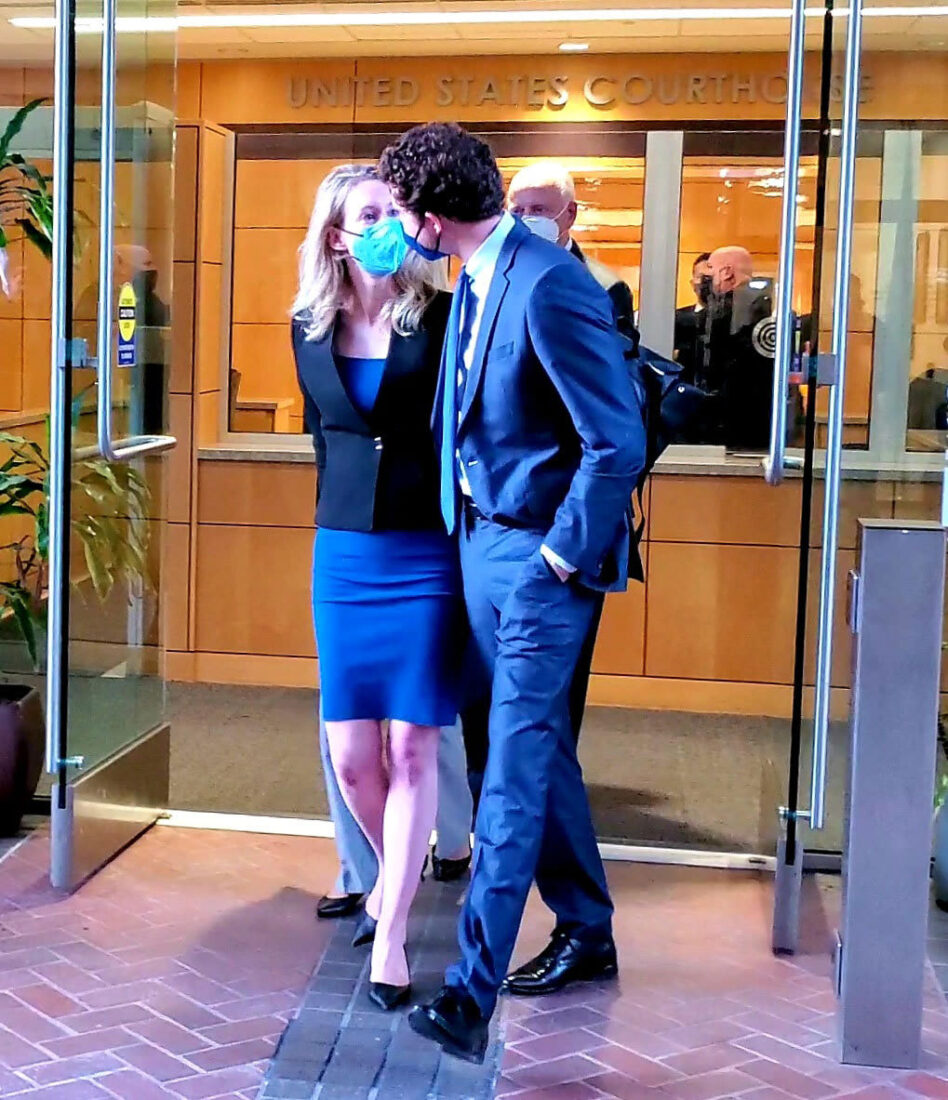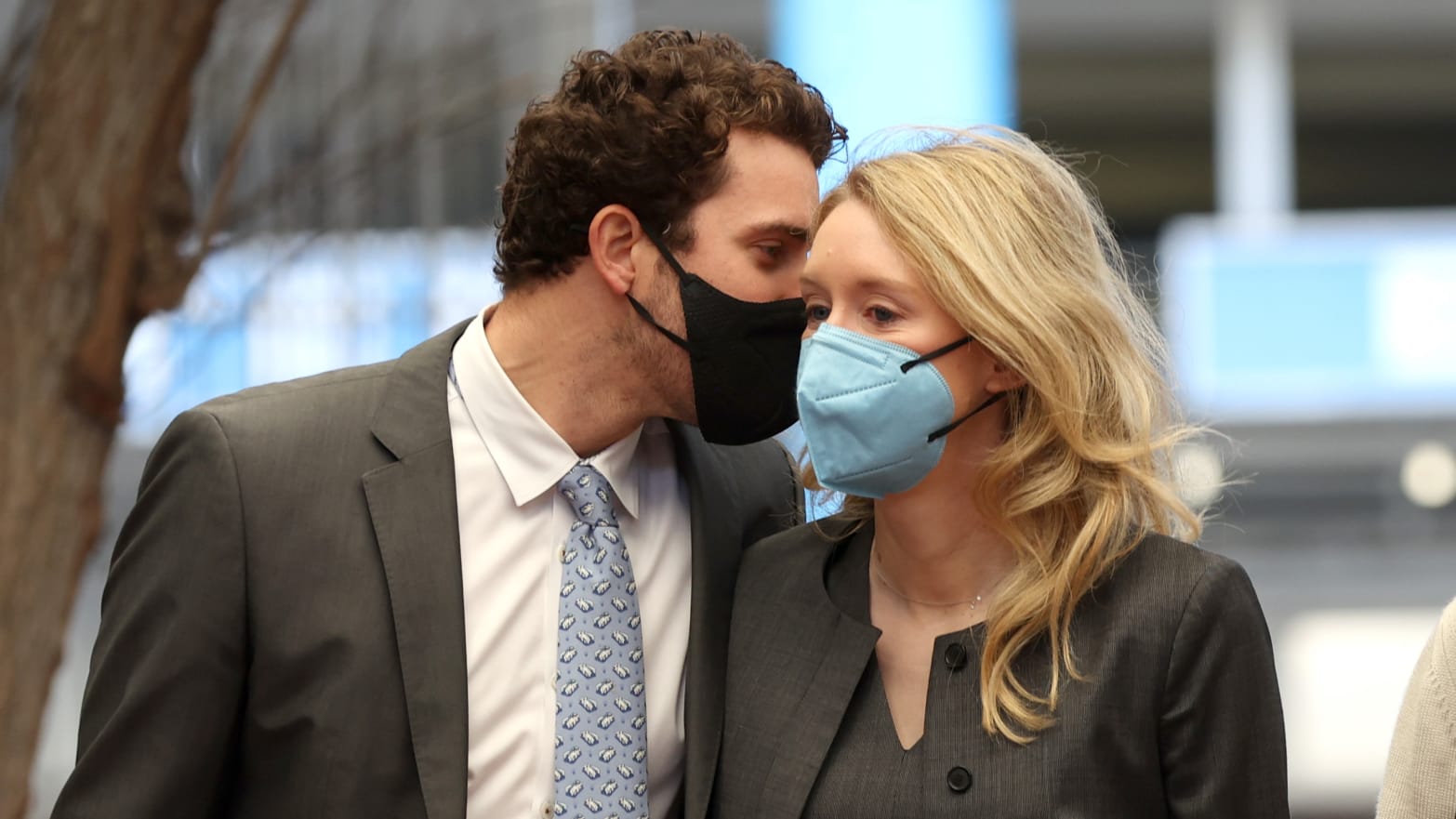Elizabeth Holmes clutched her mom’s hand ahead of brutal closing arguments in Theranos trial
A federal prosecutor was out for blood Thursday in his detailed closing statement that accused Elizabeth Holmes of duping investors and consumers into believing her novel medical screening technology actually worked, even though it didn’t.
As he began to wrap up a trial that has stretched on for more than 15 weeks, assistant U.S. Attorney Jeff Schenk focused on a central accusation that Holmes not only knew her Silicon Valley start-up could not deliver functioning blood testing devices, but intended to lie about those products too, he said.
“Holmes made a decision to defraud her investors and patients,” Schenk said. “That choice was not only callous, it was criminal.”
Prosecutors accuse Holmes—a 37-year-old Stanford dropout—of conning investors into ponying up $700 million for Theranos, her company founded in 2003 that claimed its devices could perform numerous tests with just a finger prick of blood. In addition to investors, patients shared personal accounts of ill-performed blood screenings, which showed a false-positive test for prostate cancer, and another that said a woman had miscarried even though she hadn’t, according to Schenk.
Holmes arrived just before 8 a.m. outside the federal courthouse on a rainy Thursday, greeted by a long line of nearly a hundred spectators and reporters, some of whom had been waiting for five hours to get a seat inside. Rumors circulated that now—in the final days of a trial that had captured such widespread national attention—some attendees had hired stand-ins via TaskRabbit or dispatched interns to keep their place in line.
Wearing a cobalt blue shift dress, a complementing light blue mask and black blazer, Holmes clutched the hand of her mother, Noel, and hastily made her way past the crowd and through security. Someone asked as she entered the courthouse, “How are you feeling today?” She didn’t reply.
In the courtroom, Holmes mostly trained a blank gaze on Schenk, whose argument stretched several hours and covered witness testimony, charges, and refuting claims from her attorneys. His point-by-point statement revisited a winding road of all defenses and accusations heard in nearly four months of trial, including her relationship with Ramesh “Sunny” Balwani, former Theranos president and Holmes’ ex-boyfriend. He had a bad temper and demanding management style, according to her lawyers, and Holmes said he sexually abused her, which he has denied.
“Your verdict does not validate her claims of abuse,” Schenk said. “You do not need to decide whether abuse happened.”
Balwani and Holmes—who founded Theranos at age 19—face 11 counts of wire fraud and conspiracy to commit wire fraud, although Balwani’s trial is set to commence separately in January 2022. They both pleaded not guilty, but if convicted, the crimes would carry a maximum sentence of 20 years behind bars.

Holmes defended herself on the witness stand in the final days of testimony, shifting blame for Theranos’ faulty products onto company subordinates she trusted. She believed the blood tests were so reliable that Holmes and her relatives used them, too, according to defense attorney Lance Wade. But Schenk fought against those claims Thursday, showing jurors emails and text messages, and replaying recorded phone calls Holmes made to investors discussing company performance and viability.
“Imagine for a moment what an honest pitch would have sounded like,” Schenk said. “She chose fraud over business failure,” he said.
He and defense attorney Kevin Downey argued a full six hours Thursday, addressing nuanced areas of the case like whether Holmes’ unauthorized use of Pfizer’s logo on company documents constituted fraud; whether Holmes provided media outlets false information to manipulate investors; and whether she overinflated how much the U.S. military had integrated Theranos products in medevacs and helicopters.
“She’s making false statement after false statement about Theranos’ work with the Department of Defense in order to get investors,” Schenk said.
In his closing, Holmes’ attorney Downey said the tech wunderkind “was building a business and not a criminal enterprise.”
“She believed that she had invented a very valid form of technology that she was submitting to the Food and Drug Administration to take to the market,” Downey said. “She had no fear of showing that technology to people outside the company.”
Court adjourned at 3:45 p.m., and Holmes departed a short time later hand-in-hand with her mother and husband, hotel heir William “Billy” Evans. Stepping out of the courthouse confidently in black pumps, she locked eyes with Evans in a show of support from him, as photographers and reporters flanked the group from both sides. They followed the family down the street as they walked, peppering questions that Holmes did not answer.
Downey continues his closing statement Friday morning.
This story originally appeared in The Daily Beast here.
It won an award in digital news from the San Francisco Press Club.

Leave a Reply